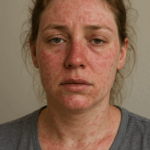At AskDoctor.ai, we have created this content to provide you with valuable knowledge about low levels. Our goal is to offer both information and inspiration—helping you understand the causes, symptoms, and solutions of the problem. You are not alone; through knowledge and community, we believe you can confidently navigate this journey.
Testosterone, often referred to as the “male hormone,” plays a crucial role in men’s health, affecting everything from muscle mass and bone density to mood and sexual function. However, as men age, their testosterone levels can decline, sometimes leading to a condition known as low testosterone or “low T.”
This condition can have significant effects on a person’s quality of life, but the good news is that there are many treatment options available. In this blog, we will dive deep into testosterone, exploring its symptoms, causes, and available treatments, all in a simple and conversational style.
What is Low Testosterone?
Testosterone is a hormone primarily produced in the testicles in men. It’s responsible for the development of male characteristics such as muscle growth, facial hair, and a deep voice. It also plays a key role in maintaining energy levels, libido (sex drive), mood, and even cognitive function. In women, testosterone is also present in smaller amounts and plays a role in the maintenance of bone strength and muscle mass.
Low testosterone refers to when a man’s testosterone levels fall below a normal range, which is typically between 300 and 1,000 nanograms per deciliter (ng/dL) in adult males. When testosterone levels drop below this threshold, it can lead to several physical, emotional, and sexual symptoms.
Symptoms
If you’re wondering whether you might be experiencing low testosterone, it’s helpful to know the common signs and symptoms associated with this condition. These can vary from person to person, but generally, the symptoms can be categorized into physical, sexual, and emotional.
Physical Symptoms
- Fatigue and Decreased Energy: One of the most common signs of low levels is a sudden feeling of tiredness and a decrease in energy levels. Studies have shown that men with this are approximately 40% more likely to report feelings of fatigue compared to those with normal testosterone levels. If you have low levels, you may find yourself more sluggish or fatigued, even after a full night’s rest.
- Reduced Muscle Mass and Strength: Testosterone is vital for muscle growth. Low levels can lead to a noticeable decrease in muscle mass and strength, which can make everyday activities feel more challenging.
- Increased Body Fat: Some men with low levels may notice an increase in body fat, particularly around the chest or abdomen.
- Reduced Bone Density: Testosterone helps maintain bone strength, so low levels can lead to thinning bones, making them more prone to fractures. Research indicates that low levels is a significant cause of secondary osteoporosis in men, with some studies reporting that 16–30% of osteoporosis cases in men are related to hypogonadism (low testosterone).
- Sleep Disturbances: Low levels can also affect your sleep patterns, leading to insomnia or disrupted sleep.
Sexual Symptoms
- Reduced Libido (Sex Drive): One of the most direct impacts of low levels is a decrease in sexual desire. Men with low T often experience a significant drop in their interest in sex.
- Erectile Dysfunction: Testosterone helps with achieving and maintaining erections. Low levels of this hormone may contribute to erectile dysfunction, where it becomes difficult to get or maintain an erection. Around 20 to 40 percent of men with erectile dysfunction have low testosterone.
- Reduced Semen Volume: Testosterone also plays a role in semen production. Men with low T may notice a decrease in the amount of semen produced during ejaculation.
Emotional Symptoms
- Mood Swings and Irritability: Testosterone has a profound effect on mood regulation. Low levels of this hormone may contribute to feelings of irritability, frustration, and sadness.
- Depression: A significant drop in testosterone can lead to symptoms of depression, such as feeling down or hopeless, losing interest in activities you once enjoyed, or feeling more anxious than usual.
- Memory and Concentration Problems: Some men with low levels report experiencing issues with memory, concentration, and mental clarity, which can affect their daily lives and performance at work.
Causes of Low Testosterone
Several factors can contribute to low levels. Understanding these causes can help you determine whether your testosterone levels might be low.
- Aging
As men age, testosterone levels naturally decline. Testosterone production typically peaks in a man’s late teens to early 20s and begins to decrease by about 1% per year after the age of 30. This gradual decline can sometimes lead to low levels in older men.
- Health Conditions
Certain medical conditions can contribute to low levels. These include:
- Obesity: Excess fat, particularly abdominal fat, can lead to lower levels. Fat cells convert testosterone into estrogen, which can lower overall testosterone production.
- Diabetes: Type 2 diabetes has been linked to low levels, as high blood sugar levels can impair the body’s ability to produce testosterone. Research indicates that approximately 25% to 40% of men with T2D experience hypogonadism, a condition characterized by low levels.
- Sleep Apnea: This sleep disorder, where breathing stops and starts during sleep, is associated with a decrease in testosterone levels.
- Chronic Illnesses: Conditions like liver disease, kidney disease, and HIV/AIDS can impact hormone production.
- Hypothyroidism: An underactive thyroid can also cause low levels.
- Pituitary Disorders: Since the pituitary gland in the brain helps regulate testosterone production, disorders affecting the pituitary can lead to low T.
- Medications
Certain medications can interfere with testosterone production. These include opioid pain medications, steroids, and medications used to treat cancer or HIV.
- Injury or Infection
Injuries or infections that directly affect the testicles can impair testosterone production. For example, mumps or trauma to the testicles can damage testosterone-producing cells.
- Genetic Conditions
Some genetic disorders, such as Klinefelter syndrome, can result in low levels from birth. These conditions often require medical intervention to manage testosterone levels.
Diagnosis of Low Testosterone
If you suspect you have low levels, the first step is to see a doctor. A healthcare professional will take a thorough medical history and perform a physical examination. They may also order a blood test to measure your testosterone levels. Typically, multiple blood tests are done throughout the day to get an accurate reading, as testosterone levels fluctuate during the day. The best time to measure testosterone is in the morning, when levels are at their highest.
Treatment Options for Low Testosterone
The good news is that low levels is treatable. Several options are available to help raise testosterone levels and alleviate symptoms. The appropriate treatment depends on the cause of the low levels and the individual’s health condition.
Testosterone Replacement Therapy (TRT)
Testosterone replacement therapy (TRT) is the most common treatment for low levels. TRT can help restore normal testosterone levels and improve symptoms. There are several ways TRT can be administered:
- Injections: Testosterone can be injected into the muscle every one to two weeks.
- Topical Gels or Creams: These are applied to the skin daily to absorb testosterone into the bloodstream.
- Patches: Testosterone patches can be applied to the skin and replaced daily.
- Pellets: Tiny pellets that release testosterone can be implanted under the skin and last for several months.
- Oral Testosterone: Oral testosterone is also available, although it’s less commonly used due to potential liver side effects.
While TRT can be highly effective, it’s important to note that it may not be suitable for all men, especially those with prostate cancer or other serious health conditions. Your doctor will carefully assess your situation before recommending TRT.
Lifestyle Changes
Certain lifestyle changes can help improve testosterone levels naturally. These include:
- Exercise: Regular physical activity, particularly strength training and high-intensity interval training (HIIT), can help increase testosterone production.
- Healthy Diet: A diet rich in healthy fats, lean proteins, and vitamins (such as vitamin D and zinc) can support testosterone production. Avoiding processed foods and excessive sugar is also important.
- Sleep: Getting adequate, quality sleep is crucial for maintaining healthy testosterone levels. Aim for 7-9 hours of sleep each night.
- Stress Management: Chronic stress leads to increased cortisol levels, which can suppress testosterone production. Practicing stress-relieving activities like meditation, deep breathing, or yoga can help.
Medications for Underlying Conditions
If low levels is caused by another underlying condition, such as obesity, diabetes, or hypothyroidism, treating that condition may help improve testosterone levels. For example, losing weight through diet and exercise may naturally raise testosterone levels in obese men.
Alternative Therapies
Some men turn to natural supplements or herbal treatments to boost testosterone levels, such as fenugreek, ashwagandha, and tribulus terrestris. However, the effectiveness of these supplements is not well-established, and it’s important to discuss any potential treatments with a healthcare provider before starting them.
Positive Experience With Hormone Replacement
Reddit User Huxley00 says that he is 36 years old and has been on testosterone replacement therapy (TRT) for three years. Before starting treatment, he experienced symptoms such as low libido, fatigue, low confidence, loss of lower leg hair, a youthful appearance with no acne, poor gym progress, and depression. TRT significantly improved his quality of life—sexual enjoyment increased, morning erections returned, workouts became more effective, and mental clarity improved.
However, managing estrogen levels proved to be the most challenging aspect of TRT. Both high and low estrogen levels had negative effects, highlighting the importance of careful estrogen management alongside testosterone supplementation. TRT, therefore, involves more than just testosterone replacement; it requires ongoing monitoring and adjustment of estrogen levels.
It’s An Undulating Journey With Lots of Trial & Error
A Reddit User also views TRT as a success. He had to adjust his protocol a few times, with each change culminating in noticeable improvements. Recently, he added HCG to address issues like shrunken testicles and decreased sensitivity. In terms of benefits, he noticed significant changes: increased muscle mass and reduced body fat, which has been especially noticeable to their wife, who frequently compliments the size of their shoulders and back. He also feels stronger and can work out five days a week without the extreme fatigue he experienced before.
Overcoming Low Testosterone
You can also check out this inspiring and deeply moving story on how a young man overcame the problem of low testosterone.
Wrapping It Up
Low testosterone is a common condition that can affect many aspects of a man’s health, from physical strength and energy to mood and sexual function. The good news is that low T is treatable, and with the right approach, most men can significantly improve their quality of life. If you think you might be suffering from low levels, don’t hesitate to consult with a healthcare provider. They can help you identify the cause of your symptoms and determine the best course of action for treatment.
By understanding the symptoms, causes, and available treatments for low levels, you can take the necessary steps to regain your health and vitality. Whether through lifestyle changes, medical interventions, or a combination of both, it’s possible to manage low levels and live a healthy, active life.









Leave a Reply